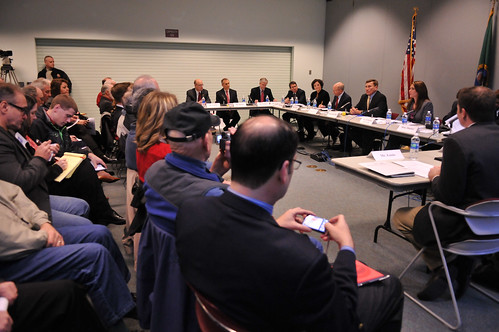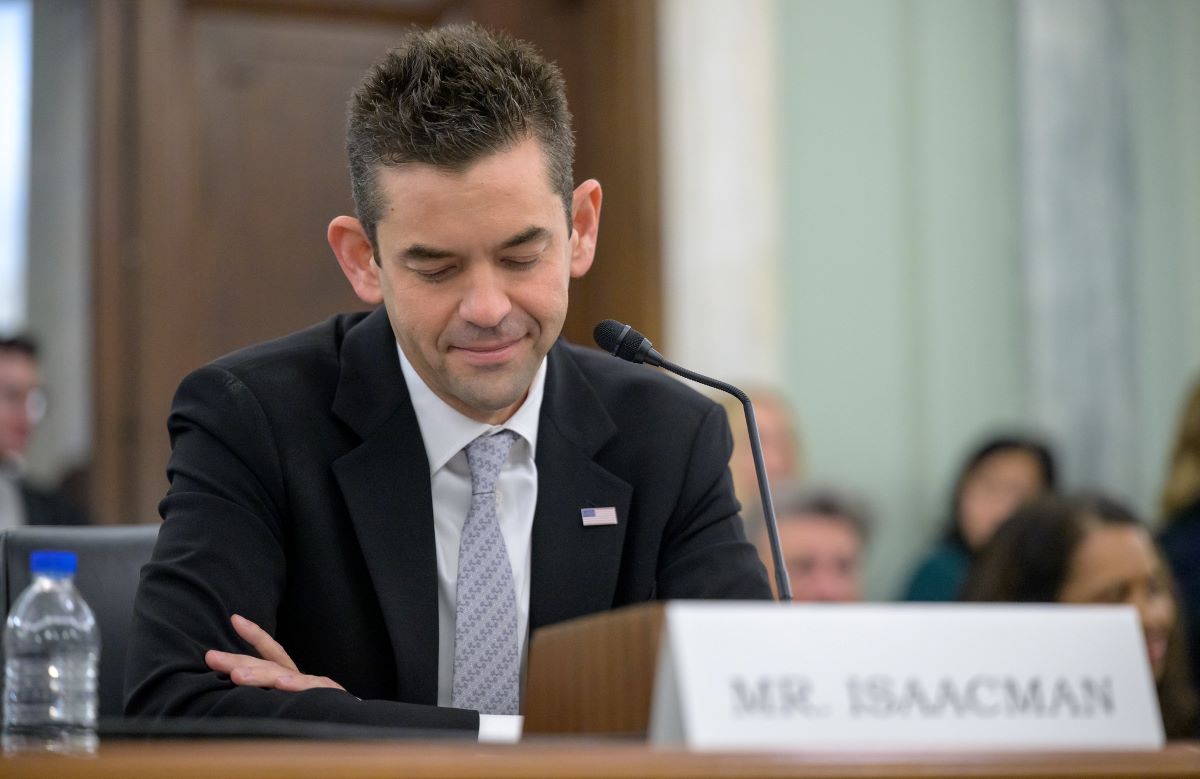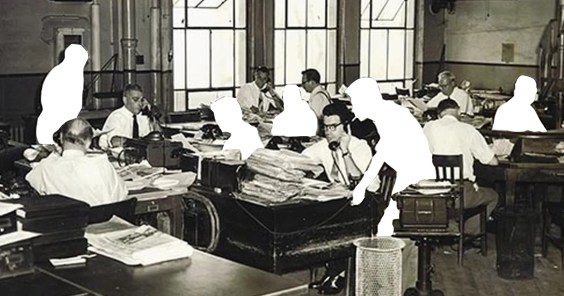Cross-posted from BikePortland
At the outset of the "listening session" on the next long-term transportation bill in Vancouver yesterday, House Transportation and Infrastructure committee chair John Mica tried to make it clear that he wanted to talk about crafting legislation, not specific projects. Unfortunately not everyone got the message.

In his opening remarks, Mica told the overflow crowd of about 120 people (with at least twice that many waiting outside), that he didn't want to debate specific local or regional projects. "That is not the purpose of this meeting," he said, "We're not going to entertain specific project recommendations." The purpose of the meeting was only to "solicit ideas on how we can craft legislation." Mentioning specific projects was meaningless, Mica told the crowd, since Congress is "not taking earmarks." The projects instead, he said, will be set by policy, "and you have the opportunity today to help us in that regard."
Before handing the mic over to his colleagues, Mica said something that should please active transportation and transit advocates.
We're under the sixth extension of the highway, as it's sometimes referred to, or transportation bill, which would be more accurate since it's a multi-modal policy setting bill.
Sitting around Mica were fellow members of Congress and a host of regional transportation bigwigs. Senior member of the House T & I Committee Peter DeFazio (D-OR) was there, as were other members of the committee -- Jamie Herrera Beutler (R-WA) and Bill Shuster (R-PA). The panel also included ODOT rep Don Wagner, WashDOT Secretary Paula Hammond, Chanda Brown from Oregon Iron Works, Clark County Public Works Director Peter Capell, a rep from Associated General Contractors, and others.
Despite Mica's calls to not discuss specific projects, a large portion of the hearing was devoted to discussing the Columbia River Crossing project. Other major themes of the meeting were jobs creation, the impact of environmental regulations on project timelines, the pros and cons (thanks to Rep. DeFazio) of public private partnerships as a revenue stream, more local control of project decisions, and how to "do more with less."
To set the stage for the discussion, Congressman DeFazio painted a dire picture of the state of our nation's transportation system. 150,000 bridges need "significant" rehabilitation or replacement, 40 percent of pavement on our highway system needs to be reconstructed, and we're so behind on transit spending, DeFazio said, our systems are deadly:
We have a $60 billion backlog on transit investment. It's gotten so bad we're killing people with the existing system; like in Washington D.C. on Metro where cars are so outmoded they put the ones that don't work anymore in the middle with cars on either end hoping the whole thing might work and sometimes it doesn't and people have died.
As for what's likely to be in the new transportation reauthorization, DeFazio said they're estimating $260 billion (with existing revenues) over six years. That's not nearly enough, DeFazio said, since a bi-partisan task force estimated we need $460 billion just to maintain the current system.
We are not spending near enough money to maintain the current, deteriorating state of infrastructure in America let alone meet our future, 21st century needs.
DeFazio also shared a bit of a zinger about the estimated $4 billion cost of the Columbia River Crossing. He recounted a trip to France where he and Mica got a tour of a "state of the art" bridge that was built for $800 million. When people come to his office to talk about the CRC, he said, "I say go online, look up that bridge and then tell me how it's going to cost $4 billion to go over the Columbia River!" "I'm pleased," DeFazio said, "that both our governors have recently said, let's step back from this and look at the reality of the design and other elements."
It's rare for a member of Congress — especially a high-ranking member of a committee that sets funding policy — to share such a clear opinion on the controversial CRC project.
About the challenge ahead, DeFazio turned to Mica and said, "John has a tremendous challenge because, how are we going to squeeze $460 billion of investment out of $260 billion in existing revenue? We're going to do things differently. I still think we need some new revenues, but that, for the moment, is off the table."
By "new revenues," DeFazio was making a veiled reference to raising the gas tax, an idea that Chairman Mica has said is "off the table."
Another member of the House T & I Committee, Congressman Bill Shuster, prefaced his remarks by saying he's "a conservative Republican" but that it's okay for the government to be involved with infrastructure investment because it's in the constitution (Article I). As for how the government should pay for infrastructure, Shuster said they're not able to raise the gas tax because, "the will of the American people is not there to support it." Instead of charging at the pump to raise revenues, Shuster proposed public-private partnerships ("getting the private sector involved") and tolling.
The first invited panelist to speak was Washington DOT Secretary Paula Hammond. Mica warned speakers to not talk from prepared statements, but she still delved right into a speech. A few minutes into her remarks, Mica actually cut her off. "Madame Secretary, let me tell you, put that away," he implored. "Tell us some specifics, what do you want to see in or out of this law?"
Hammond went on to say that her agency is smarter these days and that instead of just adding capacity when highways fill up, they are doing, "not more with less, more strategic with less." "We use every inch of pavement we have." She also spoke off managing demand through tolls and she gave a big push for transit and the importance of the Amtrak Cascades line.
Hammond wasn't the only speaker Mica cut off. Michael Ennis, Director of the Center for Transportation at the Washington Policy Center; Larry Paulson, Executive Director of the Port of Vancouver; and Clark County Director of Public Works Peter Cappel were all called out by Mica to cut to the chase and offer clear specifics about what they'd like to see in the new transportation bill.
Even though some speakers had a hard time focusing on specifics and much of the hearing was gobbled up by the CRC project, there were suggestions offered to Mica and the other members. It was even a bit refreshing to see DeFazio and Mica scribbling notes as people spoke.
There was a lot of discussion about how EPA regulations and environmental mitigation in general has become "extremely onerous" (as both Cappel and Hammond put it) on project timelines. Joe Correy, a rep from Associated General Contractors, said, "We need less regulations." Cappel from Clark County Public Works said EPA regulations are "one of the biggest challenges" he faces. Several panelists spoke to how environmental mitigation requirements result in skyrocketing project costs.
Rep. Shuster spoke of his work in the Northeast part of the country. "We faced bats, snails, fish, trees, you name it, we faced it... Everyone is concerned about the environment, but we've got to find the right balance."
The best point made about that topic came from Chandra Brown of Oregon Iron Works. Her company is fueling the made-in-America streetcar boom. She spoke about how her rail projects must submit environmental impact statements even though they use existing right-of-way and "they're just rails in the street!" Brown also suggested making economic development a criteria for funding transportation projects.
In the end, this hearing made almost no progress on the largest question facing legislators: revenue. Besides a few quick mentions of tolls (which are just marginally more politically feasible than gas tax increases), public-private partnerships were the only real revenue-generating policy that was discussed; but even Rep. DeFazio described in detail how even those "are no magic bullet."
Without a clear new revenue stream, and with a gas tax increase being a taboo subject, the future still looks very murky.
Unfortunately, Rep. Mica only left a few minutes at the end of the hearing for citizen input. Only about five people got a chance to speak. (Read more about what wasn't heard at the hearing in BikePortland's story from yesterday.)





